■The 25th START Program (Indonesia)
For two weeks from August 29, 2015 to September 11, 24 first-year undergraduate students took part in the 25th START Program*. Led by Associate Professor Ayami Nakaya (International Center) and two other teaching staff members, the students went to Universitas Brawijaya (Brawijaya University) in Malang, East Java, Republic of Indonesia.
At the Universitas Brawijaya, the students had Indonesian language lessons and lectures in English on Indonesian history, economy, politics, traditional arts, environmental issues, relations with Japan, urban development and food processing. For them, it was the first time to come in contact with Indonesian language. But after interacting with the local people they started to realize the importance of communicating in the language of their host country. At the beginning, the START participants felt uncomfortable and were not used to listening to lectures in English and couldn’t understand them completely. However, through the preparation and review of lessons and exchanging information with one another, they soon became able to ask questions concerning the lessons or issues they wanted to know about Indonesia.
Besides the lectures, the START participants deepened their mutual understanding with students of Universitas Brawijaya by going together on city tours and introducing their cultures to each other. Furthermore, they learnt the traditions and diversity of Indonesia through Indonesian traditional performances, fine arts experiences and visiting temples. The participants also enjoyed a homestay of three days and two nights on a weekend, and they got a warm welcome at the village of their host families. The students felt the hospitality of the Indonesian people and had the opportunity to experience their daily life. This is a precious experience they couldn’t have had by staying at university the whole time.
On the last day, all participants made a presentation in English on the topic of his/her choice which he/she has investigated during their two-weeks stay (topic examples: Japanese language education in Indonesia, medical issues, education on disaster prevention, community development issues, garbage problem etc.). At the farewell party, the students expressed their gratitude for the fulfilling two weeks to the host teachers and local students, and also their reluctance to say goodbye.
After returning to Japan, the students had a follow-up session and confirmed their training results based on their research presentation and on the concept of Global Core Competencies (competencies required to be a world-class manpower). Looking at themselves objectively helped to reset their goals, and they became able to consider which kind of efforts should be taken to reach them. Two weeks was a short period, but the program was fulfilling enough to make each of them feel that they had made significant progress.
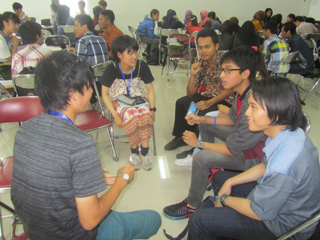 Discussion at the lesson of Japanese Program |
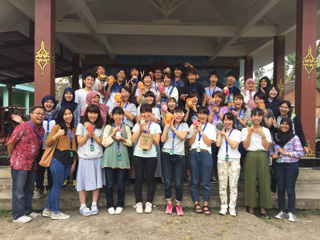 Enjoying traditional Indonesian dance |
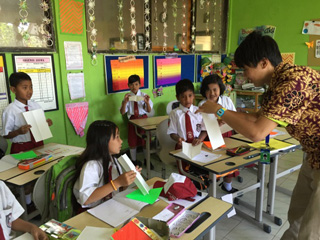 The students visited a primary school at the village of their host families |
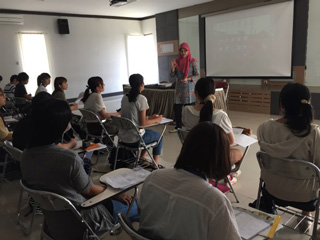 Indonesian language and conversation lessons |
■The 26th START Program (Taiwan)
For two weeks from August 30, 2015 to September 13, 18 first-year undergraduate students took part in the 26th START Program. Led by Associate Professor Naoki Maeda (Graduate School of Social Sciences) and two other faculty members, the students went to National Chengchi University in Taiwan.
In Taiwan, the participants attended Chinese language lessons and listened to lectures on “History of Taiwan”, “Japan-Taiwan relations”, and “Human rights” in three different classes. Learning Chinese is new to some students, but they felt the joy in the improvement of their language ability through the preparation and review of lessons every day. At the lessons, the participants were able to discuss in detail from their observation of what they learnt beforehand and what they learnt there and then.
Other than that, the START participants went on a field trip to the Deng Nan-jung Memorial Museum, the 228 Memorial Museum, the Chiang Kai-shek Memorial Hall and the National Palace Museum together with students from the National Chengchi University. During the tours, the HU students deepened their knowledge by questioning about the exhibition display and exchanging information about history and culture with students from National Chengchi University.
On the weekend, the students participated in a guided tour to Quemoy, an island which was at the forefront of the battle with the Chinese mainland during the Chinese Civil War. They visited the Chiunglin Tunnel where traces of war remained, the Mashan Broadcasting and Observation Station, the August 23 Artillery War Museum, the Jhaishan Tunnel and the historic sites of Quemoy.They were able to see a few warships of the People’s Republic of China on the opposite shore, and gave them an opportunity to think about the political issues which are still continuing. The START participants received a warm welcome from the Vice-President and the students at the National Quemoy University, and studied about Japan-Taiwan relations together. After the lesson, students and leading staffs from both universities had lunch together and had a pleasant time chatting with each other in Japanese, English and Chinese.
During this program, the HU students spent busy days attending lessons, visiting facilities and interacting with Taiwanese students. However, they devoted themselves wholeheartedly to studying Chinese and preparing for their group presentations, and gained useful experiences for their future undertakings.
We also noticed START participants and faculty members and students of Taiwan exchanging SNS contacts, this shows the success and a promising future of START Program. A class even made a promise with their Chinese language teacher to meet again in Japan.
At the follow-up session after the program, participants made remarks on a wide perspective from the importance of studying history to their awareness towards their major, their interactions with Taiwan students, etc. This shows how much they have gained from this two-week program.
The effect of START Program depends on how much effort the participants put in. It will not only affect their campus life, but also determine their growth in the future. With the experience they gained from this START Program as their spiritual nourishment, the participants reaffirmed their challenge to strive to achieve their goals and strengthened their bonds at the follow-up session.
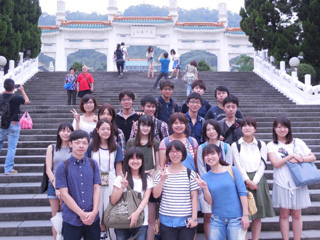 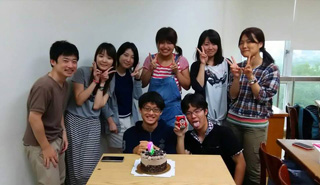 (Left) At the National Palace Museum with the students of National Chengchi University (Right) Teaching staff of National Chengchi University celebrating a student's birthday |
|
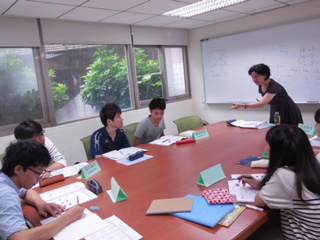 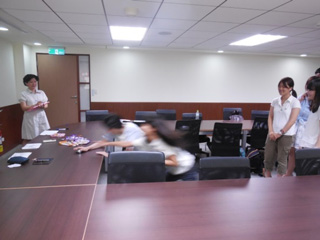 (Left) Getting ‘showered’ with native Chinese language in a small class (Right) Game-style lesson among three classes. Let’s see who’s faster? |
|
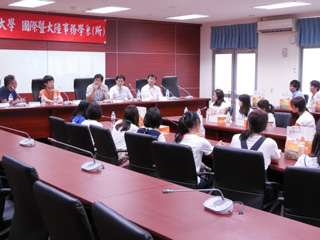 Faculty members and students exchange meeting at the National Quemoy University |
■The 27th START Program (Australia)
For two weeks from September 11th, 2015 to September 28th, 30 first-year undergraduate students took part in the 27th START Program *. Led by Professor Nobuhito Yoshinaka (Graduate School of Social Sciences) and 2 other faculty members, the students went to Flinders University in Adelaide, South Australia.
The 27th START Program (Australia) consists of 4 special features.
1. Learning together with local staffs and students in a substantial English Course
2. Experience the study abroad life through normal classes and special lectures
3. Group presentation on various Australian-specific issues/topics
4. Homestay in an individual host family
1. Under the guidance of 3 English teachers in the Flinders University Language School, the students learnt about English expressions, pronunciation, vocabulary and Australian culture through workbook in the classroom, group work, discussions with local students and city field trip. They visited a local elementary school and observed the difference between the education of Australia and Japan. They also introduced the Japanese culture to the elementary school children through activities like Origami (the art of folding paper into various figures). They had fun communicating in English.
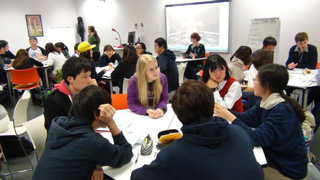 Discussion with local students |
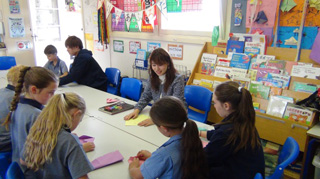 Introducing Japanese culture to elementary school children |
2. The students attended regular classes with other local students from Flinders University and special lectures on topics regarding Australia. Through these classes, the students were not only exposed to English, but also gained specialized knowledges at the same time. In addition, for students who aim to get credit exchange on a long-term study abroad in the future, it was a good opportunity for them to know the actual speed of English used in the regular classes, and also how classes are conducted overseas. By performing discussions and group work alternately at the special lectures, the students were able to check their comprehension of the lesson as they proceed.
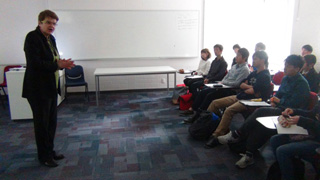 Lecture on the Aborigines |
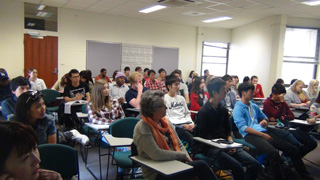 Attending the regular lesson with local students |
3. On the last day, the students were divided into 6 groups and each group made a thirty-minute presentation in English. The students organized their presentation based on researches and interview surveys with local students on topics concerning Australia, such as mineral resources, water resources, Aborigines, relationship with Asia, multicultural, biodiversity, etc. Making full use of the presentation skills they learnt from the 3 teachers, each group presented their topics in English with academic facts added with their sense of humor.
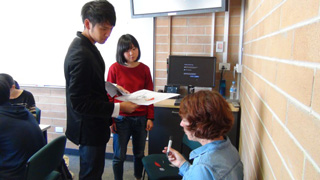 Local teacher checking on the presentation content |
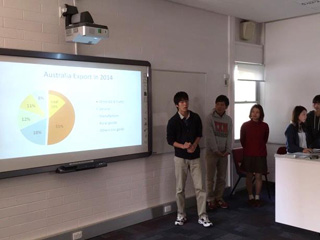 The actual group presentation |
4. Host families are one of the indispensable elements in this START Program. Aside from the time in the university, they will be spending most of their time with their host families. They get daily life support from their host families like learning how to take a bus, how to move around in town, also getting support with their homework and going out together on holidays. Some students had problem communicating with their host families at first but after living and getting used to the English environment, they were able to talk to each other. Some even continued to keep in touch with each other after coming back to Japan. It was a precious and unforgettable experience for them.
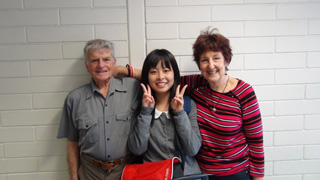
Each student stay with a different host family |
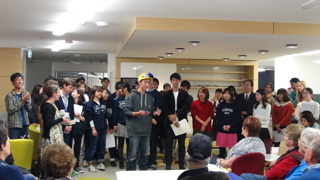 Speeches by students expressing their gratitude at the farewell party |
At the visit to the Kangaroo Island on the weekend, the students learnt about Australian specific wild animals and enjoyed the great scenery. They had a very profitable time with their teachers and local guides, diversifying and expanding their knowledge on Australia.
The students had a short but meaningful time and they completed the whole program without illness or injury. At the follow-up session, we had feed-backs from the students as follows: “I was eager to join the program and I thought there will be no problem using English to communicate. However, everything was not as expected. But as the time goes, I was able to understand and reply. I felt that my communication skill has improved. Having an acquaintance in Australia gives me the motivation to continue studying English”. Another one said, “At first, I was not interested in English so much. The meeting with the teachers and highly motivated students in Australia, I started to consider working hard to gain the competencies to be a world-class manpower. It is obvious that the students have grown and matured after this program, and they are heading towards a new goal. The university will move forward together with the students and continue to support them with all they can.
* The START Program provides first year students who have little overseas experience the opportunity to attend lectures and see everyday life at a foreign partner university in order to raise interest in international/cross-cultural activities and studying abroad. It was established in 2010 and by the end of the first half of the academic year 2015, it has already been held 27 times. In the first half of the academic year 2015, the program was held for three times dispatching students to Indonesia, Taiwan and Australia. The Hiroshima University Fund financially supports part of the research expenses to lessen students’ economic burden and to give a broader population of students the opportunity to study abroad. The participants went to study abroad following a two-month training period before departure. Back in Japan, they had a follow-up session.
【Inquiries】
International Exchange Group,
Education and International Office,
Hiroshima University
TEL:082-424-4346
E-mail:kokusai-ryugaku(AT)office.hiroshima-u.ac.jp
(* Please replace(AT)with @)

 Home
Home














